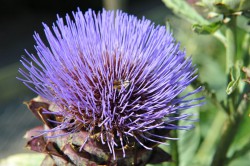Special Offers
Redeem Offer Code
Redeem Gift Voucher
Scarecrow Members
Our Feedback
Received my brown turkey fig today. Good size good condition well packed. Thank you.
L.L., Southboune
Cardoon Plant Bianco Avorio





Cynara cardunculus 'Bianco Avorio'
- Stems or leaf stalks are eaten after blanching.
- Will reach 6 feet (1.8 metres) tall.
- Easy to grow.
- Very pretty!
Supplied as compost block-grown plants.
This Product is Available Now.1 or more £2.50GBP each. Group & quantity discounts
Description
A vegetable widely cultivated in Victorian England that is related to the Globe Artichoke - except it's the stems that are cooked and eaten. As a vegetable it was featured by Harry Dodson in the BBC's Victorian Kitchen Garden series, and was also championed by Clarissa Dickson Wright of Two Fat Ladies fame.
It is the perfect vegetable to grow in the herbaceous border as it is perennial in habit, with a very attractive pink/purple flower and very striking leaves.
Recommended by the RHS to be an excellent attractant and nectar source for bees and other beneficial insects if allowed to 'go over' and flower (so if you have room leave any plants in that have gone too far rather than pulling them out straight away).
- Grows up to 6 feet (1.8 metres) tall.
- Prefers a rich, well-drained but moisture-retentive soil, and likes a sheltered, sunny position.
- Plant out from late April until August-September. Set plants 3 feet (90 cm) apart. They need a lot of space.
- Keep weed-free, and water well in dry spells. Provide stakes when the plants reach 12" (30 cm) in height.
- Cardoons are vulnerable to attack by slugs and snails. Black bean aphids and root aphids can also be a problem. We recommend spraying with our BioFriend Plant Defence.
- Cardoons are frost-tender perennials so after the plants are cut down for the winter, protect the crowns with straw, horticultural fleece or newspaper.
Pricing
This Product is Available Now.This product is subject to group discount if you are buying multiple products from the same pricing group. Other products in this group are...
Artichoke Plant Green Globe
Artichoke Plant Romanesco
Artichoke Plant Tavor
How To...
How to Grow Cardoons
Detailed advice on growing cardoons. Includes information on watering, pest control and harvesting.
General Information
A Little Information About Our Vegetable Plants (Video)
Information on the vegetable plants that Victoriana grows and how we make sure they are always hardened off before dispatch.
What's A Compost Block Grown Plant?
Information on the size of the compost blocks that Victoriana grow their plants in - and what you can expect to receive.
Pollinator Friendly Plants
A detailed guide to the seeds and plants sold by Victoriana Nursery Gardens that will attract and provide a food source to bees and other beneficial pollinating insects.

 01233 740529
01233 740529


